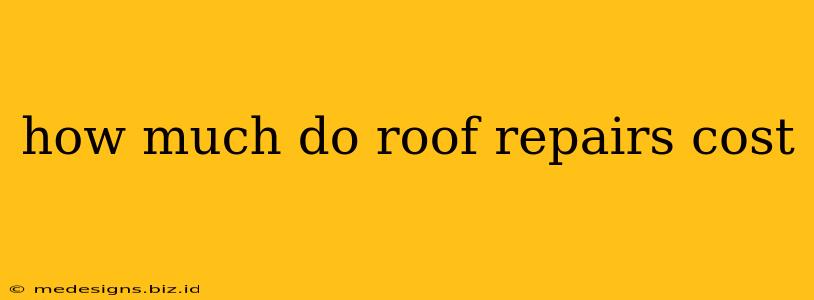Thinking about roof repairs? Knowing the cost upfront can save you a lot of headaches (and potential leaks!). This guide breaks down the factors influencing roof repair costs, helping you budget effectively.
Understanding the Variables Affecting Roof Repair Costs
Several factors significantly impact the final cost of your roof repairs. Let's explore them:
1. The Extent of the Damage:
This is arguably the biggest factor. A small leak requiring a simple patch will cost significantly less than extensive damage needing major structural work or complete shingle replacement. Minor repairs might only cost a few hundred dollars, while substantial damage could run into thousands.
- Minor Repairs: These include fixing small leaks, replacing a few damaged shingles, and addressing minor flashing issues.
- Major Repairs: These involve extensive shingle replacement, structural repairs (e.g., fixing damaged rafters or trusses), and dealing with significant water damage.
2. Type of Roofing Material:
The type of roofing material plays a crucial role. Asphalt shingles are generally the most affordable, while more durable options like tile, slate, or metal roofing tend to be more expensive to repair. Repairing a damaged tile roof, for example, will be significantly more costly than repairing asphalt shingles.
- Asphalt Shingles: Typically the most economical option for repairs.
- Tile Roofing: More expensive materials and specialized labor drive up repair costs.
- Metal Roofing: Often requires specialized tools and expertise, increasing repair expenses.
- Slate Roofing: Similar to tile, the material cost and specialized skills impact the overall price.
3. Labor Costs:
Labor costs vary based on your location, the contractor's experience, and the complexity of the repair. Expect to pay more for experienced, reputable roofing contractors in high-demand areas. Always get multiple quotes to compare labor rates.
4. Accessibility:
Difficult-to-reach areas or roofs with steep inclines will increase labor costs as they require more time and potentially specialized equipment. A two-story house with a complex roofline will naturally cost more to repair than a single-story home with a simple roof.
5. Hidden Damage:
Sometimes, the extent of the damage isn't immediately apparent. Hidden damage, such as rotted wood or underlying structural issues, can significantly inflate the final cost. Reputable contractors will thoroughly inspect your roof to identify all necessary repairs.
Getting Accurate Estimates: Tips for Homeowners
To get an accurate estimate, follow these steps:
- Contact Multiple Contractors: Obtain at least three to five estimates from licensed and insured roofing contractors in your area.
- Detailed Inspection: Ensure the contractor provides a thorough inspection of your roof and clearly outlines the necessary repairs.
- Written Estimates: Get everything in writing, including a detailed breakdown of costs (labor, materials, etc.).
- Check References: Verify the contractor's reputation by checking online reviews and contacting previous clients.
- Understand the Warranty: Inquire about warranties on both the materials and the workmanship.
Typical Cost Ranges for Roof Repairs
While precise costs vary wildly, here's a general idea:
- Minor Repairs: $150 - $1,000+
- Major Repairs: $1,000 - $10,000+
Important Note: These are only estimates. The actual cost will depend heavily on the specific factors discussed above.
Preventative Maintenance: Saving Money in the Long Run
Regular roof inspections and preventative maintenance are crucial for preventing costly repairs down the line. Catching minor issues early can save you thousands of dollars in the long run. Consider scheduling annual inspections, particularly after severe weather events.
By understanding the factors that influence the cost of roof repairs and following these tips, you can make informed decisions and protect your home's valuable investment. Remember to always choose licensed and insured professionals for your roofing needs.
